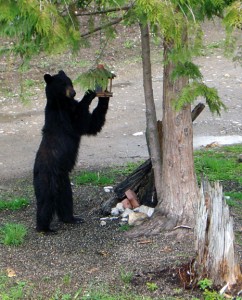
Fall is here and the bears are hungry. Bears are being seen raiding garbage cans, climbing fruit trees, and generally getting into anything containing food. At this time of year, bears are preparing for their long winter snooze and they need huge quantities of food to survive the winter. An adult human gets by on around 2000 calories per day but at this time of year a bear needs about 20,000 calories per day, Bear Aware Coordinator Sue Davies said in a statement.
“To pack in that many calories, bears look for high energy food sources,” she said in the statement, which was released on Thursday. “From a bear’s point of view, it is far easier to raid a garbage can and eat a couple of kilograms of left over bread, cheese, and bacon grease, than the 35 kilograms of huckleberries it would take to gain the same number of calories.”
Once a bear has begun finding high energy foods in a neighbourhood, it makes sense for to the bear to continue searching for them. Unfortunately for us this is not such a good idea. Once bears begin accessing food in our neighbourhood they begin to loose their natural fear of us and can become problem bears, destroying property and even entering homes.
The key to reducing the number of problem bears in our town is to manage items that attract bears into our yards. The number one attractant is garbage. Keeping garbage locked in a shed or garage until pickup day is a great way to reduce the risk of problem bears. If you don’t have a shed or garage to store your garbage, keep food items in the freezer and add to the garbage only on pickup day.
Picking your fruit as it ripens is another way to discourage bears. If you don’t have a use for the fruit, take it to the food bank, advertise it on the stoke list, or call Bear Aware (837 8624) if you are unable to manage the picking yourself.
When you do pick your fruit, please don’t put all the spoiled fruit into the compost at once. Add small amounts at a time and cover well with fallen leaves or other brown material. Freeze excess spoiled fruit and add it during the winter months.
Birdfeeders are another source of very high-energy food for bears. One kilogram of birdseed is equivalent to more than 13.5 kilograms of blueberries. Bears will go to extraordinary lengths to access this food and, during the summer and fall birds find plenty of natural food. Keep your birdfeeders for when the birds really need it, and the bears are asleep.
For more information on how to manage bear attractants, visit the provincial Bear Aware website at www.bearaware.bc.ca or our local site at www.revelstokebearaware.org.
To report bear sightings or problem bears please call the RAPP Line at 1-877-952 7277.



